|
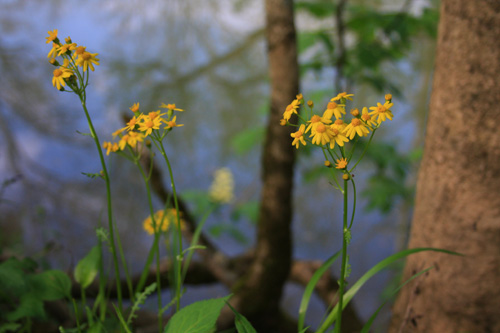
A natural bouquet of May wildflowers.
(*photo
credit)
May 1, 2010
Joseph the Worker: The Right to Work
The first day of
May has a long history involving Celtic May poles and other special
celebrations. Several decades ago, Soviet military might was
exhibited by the USSR on May Day. But both the Celtic and the
Soviet traditions have faded, though this is still a "workers' day"
to some degree. However, there is further special attention on May
first to St. Joseph the worker. We feel close to this foster father
of Jesus, with all his responsibility, trust and struggles. The
just Joseph cannot fathom why the innocent betrothed Mary is with
child. What must he do? The Spirit tells him to take her, and
Joseph follows, journeying with unwavering trust to Bethlehem with
the pregnant Mary, and then fleeing with his little family into
Egypt as refugees from Herod's reign.
Yes, Joseph is
more than a carpenter -- and that is not said with disrespect for
that noble profession. Joseph is constant in his trust and thus the
protector of the Church as an extended part of the Holy Family. He
is the patron of workers. He does not speak a recorded word in
Scripture, but remains in the background in Jesus' early life -- but
still he becomes a key figure in history, "Was this not the son of
Joseph and do we not know his family?" Joseph's humble life becomes
a target of cynics who ask whether the Messiah comes from such a
simple household.
Joseph is thrust
into a pivotal position in the coming and revelation of the Messiah,
yet he is a tradesman from hill country without degrees or wealth.
He works in obscure Nazareth, even though of the noble House of
David. He takes turtle doves, the sacrificial gift of poor folks,
when he and Mary present Christ in the Temple. He brings the family
yearly to the Temple festivals. He is the breadwinner, the overseer
of home life. Joseph is well aware that native wood is scarce, and
so carpentry involves making buildings, furniture, doors, and a
multitude of items by skillful use of materials, all needed to
provide a family's livelihood.
Work
brings on self-respect. This respect is horribly shattered when
ambitious youth discover that the dog-eat-dog world does not afford
them opportunities to do what they want. We sympathize with them,
and pray that they do not become cynical. Would that they become
the cadre of those demanding their right to work. Will it shake the
nations with their accepted bonus-takers, tax havens and deductions
for the wealthy? Why should the unemployed frighten anyone? Are we
to keep them contented as though it is our religious mission?
Should we help shake off contentment and arouse the unemployed to
recognize their self-worth? Shouldn't we break the silence about
civil rights violations? Isn't it a crime that workers are willing
and much work must be done -- and yet financial resources are
sequestered by the privileged few? Isn't the challenge to liberate
financial resources to allow willing workers to help build housing,
roads and needed infrastructure in our world?
Prayer:
St. Joseph, people pray to you to help find a place to live; I
pray also that they seek to find a place to work.
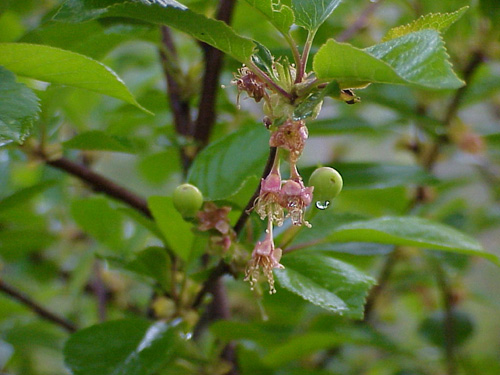
Fresh cherries enjoy a spring's soaking rain.
(*photo
by Sally Ramsdell)
May 2, 2010
Loving: The Unfinished Story
Deuteronomy
6:5 You shall love Yahweh your God with all your heart, with all
your soul, with all your strength.
What does it
mean to love God? Millions of words are spoken, written, or
sung about love, and yet love is better expressed in deeds -- to
sacrifice for another. We yearn to break out of the prison of
self-love, and to go beyond to a sometimes distant calling. We want
to fly, hang glide, rappel, experience the freedom of a skipping
child, or ride the scooter in the leaping turn. And to love is to
be free as well in a more profound manner, to abandon selfishness
and move towards the mystery of God. In the Gospel of John (Chapter
14) we see God's love, the love of us through the suffering and
death of Christ, and the love we return by performing deeds for
others.
The Second
Commandment: Love of Neighbor. Leviticus says, "You must
love your neighbor as yourself." The Shema or prayer of
hearing follows immediately after the Ten Commandments. The second
passage that Jesus relates to love of God is taken from the
"Holiness code" in Leviticus -- the collection of the principles on
how to be holy. The two commands are coupled, because love of God
is not genuine for us unless shown in love of neighbor, while love
of neighbor is not truly founded unless we recognize the source as
love of God. The infinite ocean of love stretches before us. The
motivation to love one's neighbor springs from love of God, and the
test of authenticity of love of God is found in love of neighbor.
In loving our neighbor our love of God grows. We flee from biases
and dislikes for certain cultures or races. We are to love all
-- radical Muslims, communists, skinheads, those on death row.
Jesus says, "Love as I love you."
The Good
Samaritan parable in St. Luke's Gospel identifies our neighbor,
our love of everyone even when we have special friends. Today the
Internet, TV and radio bring neighbors from the other side of the
globe into our own living rooms -- a truly global phenomenon. This
raises our consciousness to the cries of needy folks. We learn from
Mother Teresa, who saw urgent need and responded immediately -- thus
seeing what catholic means.
Love is
inclusive. The early Christian community faced the challenge to
take in Gentiles in the community. The laws that already applied to
Gentiles were included in the discussion, but certain regulations
that applied only to the Jewish community were omitted. Extending
our love to a global community will challenge us to move out and
accept the ways of other cultures. We can't be inclusive with
overabundance when living in a world of hungry neighbors. Rather we
are drawn by the power of love to share our own resources and urge
others to do the same. Our very salvation is at stake, a salvation
tied to universal love and divine mercy.
Prayer:
Lord teach us to love as Jesus has loved us, for that is our
unfinished journey to you.

Bladderpods (Staphylea trifoliata)
by streamside.
(*photo
credit)
May 3, 2010
Emphasizing Prudence in the Climate Change Controversy
Scientific
experts tell us that the planet's temperature has risen 0.8 degrees
Celsius since pre-industrial-revolution times. Some of the 2010
snowed-in crop of naysayers and denyers, and those "lubricated" by
the non-renewable energy industry, have accepted global warming
facts; however, they say these changes are due to natural cycles
and not major human manipulation or causation. A vast majority of
scientists (over 90%) accept the human causation contribution to
climate change and point to dire consequences, if the temperature
continues to rise by two degrees Celsius by 2050. More pessimistic
climate scientists say that without outright efforts on the part of
major energy-using countries such as China, the United States, and
India, the very serious two-degree rise could be doubled in this
century; this would result in catastrophic effects on certain
regions of the world.
Those
who are accustomed to living in unsustainable ways, by using far
more resources than needed, hardly ever consider the virtue of
prudence, much less justice for those who need resources now
squandered in luxurious lifestyles. Prudence means careful
management of resources at hand. Those who waste or control
resources for selfish gain, are acting contrary to prudence; they
oppose any change in practice that affects their privileged
position. On the other hand, prudent people are willing to err on
the side of caution. Here the critical consideration involves the
health and safety of human beings and Earth herself.
We
work in this imperfect world with a convergence of moral,
judgmental, and scientific evidence -- even when evidence is
incomplete and possibly exaggerated. In matters of salvation (this
involves the saving of our wounded Earth), we must be willing to
risk erring on the side of prudence. The signs of our times, the
reddening skies of climate change, stand as a real possibility. The
focus is on, "what if ...." The possible consequence is that the
poor will be gravely affected, and conditions could worsen over
time. Are current wasteful practices worth that possibility? No.
The
fallout from the disappointing Copenhagen Conference is the derision
of the green positions by ever-more-vocal denyers. However, climate
scientists talk about the long run, not the local weather at a given
time or a single year's temperature rise or fall. Climate change
may and does include more severe snowfall and winter temperatures in
certain places. Prudence considers these facts, and even
worse possible scenarios when human extravagance and overuse of
resources affect the most vulnerable through floods, droughts and
other severe impacts. Climate change denyers argue the emotional
greens are alarmists. However, don't we sound alarms when there
really is a fire or we smell smoke? To deny what a majority of
climatologists say is certainly imprudent.
Prayer:
Lord, teach us to be prudent on climate issues, not to be overly
alarmist, and to realize and take steps when human beings are found
to harm our vulnerable planet.
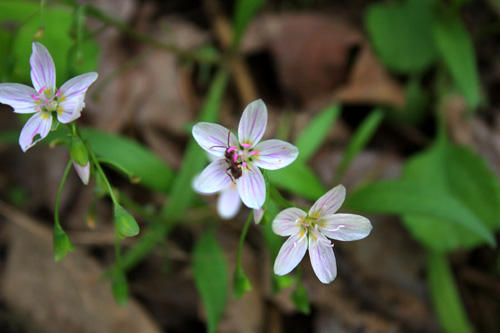
Spring beauties (Claytonia virginica) with a visitor.
(*photo
credit)
May 4, 2010
Asking
Soteriological Questions
Christ saves us all, we say,
and is that the total message's worth?
Is all
saving a matter of Christ's sole action?
Or
do we help save our wounded earth?
What
is this our imitating role:
Securing what in theory is already gained?
Proclaiming a deed that will unfold?
Or
adding chorus to a grace-filled refrain?
Is
presumption saying Earth will be saved?
And despair saying it will not?
Or is
hope's mission what Christ's members say:
"Earth will be saved, if we but.."?

Flowers of the mulberry (Morus)
tree.
(*photo
credit)
May 5, 2010 Championing
Mulberries
When
I was young, we did not have mulberries in our rather varied orchard, but when
we visited our cemetery on Decoration Day we discovered a mulberry tree. That
was my first taste of mulberries and gave birth to the thought that all
cemeteries should have edible landscaping. Why not, and why not mulberries, for
here is a native species that would be an everbearing fruit?
Since
that youthful introduction, I have come to see the value of the mulberry tree,
for it has many good qualities. On further investigation we find that
mulberries come in a variety of colors and flavors and that some are from our
side of the planet and some, such as the white mulberry (introduced for silkworm
cultivation), have been brought over from the Old World. Our Illinois mulberry
was planted in honor of a former pastor, Father Tom Imfeld; this tree has
thrived on poor soil, and it sprang up to become an almost 20-foot high tree in
less than four years; growers predict that such trees could reach 35 feet. The
tree has had a good crop of mulberries from almost the start and larger amounts
with each passing year whether wet or dry. The fruit has a wonderful taste and
comes throughout the summer months. If the berries are picked often and when
not perfectly ripe, birds tend to avoid them, for most like ripe sweet berries.
Most
mulberries tolerate poor soil and a variety of wet and dry conditions. They
are generally free of pests and diseases. The trees like full sun and would
prefer enough room to spread out. In urban areas, some residents dislike
colored mulberries, because the fallen fruit will stain everything it touches
and can be tracked onto sidewalks and into homes. For better or worse, birds
like the ripe fruit and their mulberry-stained dropping can splatter the
countryside and clothes drying too close to the trees.
Mulberry trees can be
trained so that the number of branches will not become too dense. Trees should
be pruned while dormant, because the cut place tends to bleed sap in summer.
The white mulberry is regarded as a weed tree in both rural and urban areas of
America. Depending on the sub-species, the mulberry is quite cold-hardy; it
seems to tolerate pollution, and some sub-species can even grow well in a
tub.
I
was so enamored by our Illinois Everbearing Mulberry from Stark Brothers that I
persuaded the parish to purchase three more and on this past March 17th, several
of us planted the three in a south-hillside fill area, which in the future will
be able to furnish shade for the parish hall. These trees help fulfill the
qualification for edible landscaping, that is, a good shade and a good
fruit-bearing species.
Prayer:
Lord, teach us to love the simple things of life, even the simple trees that
some regard as of little worth. Help us see value in many things that others
overlook -- including mulberries.

A moment for contemplation.
(*photo
credit)
May 6, 2010 Having
a Time for Keeping Silent, a Time for Speaking
(Ecclesiastes 3:7)
It is as important to
cultivate your silence power as your word power.
William James
They
tell us that sometimes silence is not golden -- just yellow. In fact, both our
speaking or our remaining silent have their time and place. Far better than
always opening or never opening one's mouth, is to know when to do each. Here
is a listing of silent blessing and contrasting failure to speak.
Silence
is a blessing when --
* All need time to reflect
deeply on a subject;
* Others need time to
concentrate, rest or work;
* We are preparing for a
difficult task ahead;
*
Speaking will be distracting for those performing a difficult undertaking;
*
We are at a vast and beautiful vista and no words are really desired or worthy
of the scene;
*
We are trying to make a retreat or pray in private;
* We have concluded our
remarks in an emphatic manner and all know we have little more to say;
* We and others know we have
nothing more to say;
* Outside noises bother us
immensely and so we retreat;
*
We accept deafness as a challenge and a reality with which we tend to cope as
best we can;
* We attend a wake and act
respectfully;
*
We are walking through a cemetery;
* Taps is being played;
* And we just sit in the
presence of another we love.
Silence
is a curse when --
* Someone lonely wants to
hear from us, and we have so many other things to do or places to be;
*
Our public voice means so much for the oppressed;
*
Peers demand silence so they alone can speak;
* A loved one is on the
wrong road and will perhaps, though not necessarily, listen to words of offered
advice;
* We fail to tell a loved
one who is on the wrong track just how deeply his or her actions affect us;
* Our civic duty is to vote, write in protest or
speak up as part of the need for justice;
*
Another person is hurt unjustly and we stand back and do nothing;
* We are too intimidated to
speak up;
*
Our singing, chanting, resonating voices need to be heard in unison for the good
of all; and
*
Oppressors frighten us, and we capitulate.
Prayer:
Lord, prompt us to speak when we must, be silent when we ought, and know when to
open and when to close our mouths.

A lovely, flower-lined walkway through the forest/
(*photo
credit)
May 7, 2010
Bestowing the Blessings of May
We
consider May as a blessing in itself, but it does also consist of countless
minor components called blessings in themselves. Within an atmosphere of
gratitude we recognize the ability to bestow as well as to receive blessings --
thus seeing blessings as empowering in themselves. We can make May a greater
blessed event by being especially
thankful for:
*
The forests that are now clothed in full greenery as the late oaks are finally
leafing out;
*
The flowers, the flowers of May -- the last of the litany of wildflowers along
with those in lawns such as azaleas, lilac, bridal wreath, lilies-of-the-valley,
and subtle blackberry blossoms and fragrant black locust blooms that last a
brief span and then are gone for another year;
*
The newly started and growing garden with a variety of herbs and vegetables all
seeking to grow to fullness in a short while;
*
The May rains that enhance the garden's growing plants;
*
The smell of new-mown hay -- coumarin -- that fills the air;
*
The mockingbirds and all those nestlings that are now learning to fly. May they
succeed and have a satisfying life;
*
Swimming pools and watering holes now made ready for the influx of gleeful youth
who love the splashing sound of water;
*
Graduation music and the hopes of those who seize their diplomas and move out to
a waiting and somewhat hostile world;
*
Farewells to friends at moments of change and departure, though people always
stay close today through cell phones and text messages;
*
Those speeding on the highway and hopefully giving the proper attention to the
road and not to cell phones, iPods and things to eat and drink;
* Those who defend the
security of our country at this time or in times past, that the gratitude for
their service and their memory will never be lost; and
*
Mothers everywhere that their love and care for those under their charge will
always be intense and warm, and for the rest who remember and show respect for
their mothers living and deceased.
Prayer:
For all of these we give our heartfelt thanks. May eternal life be eternal May.

Intricate flower of the wild ginger (Asarum canadense).
(*photo
credit)
May 8, 2010 Defending
Wildlife, Wilderness and Forest Commons
There is no quiet space
in the white man's cities. What is there to life, if a man cannot hear the
lonely cry of the whippoorwill or the arguments of the frogs around the pond at night?
Chief Seattle
In
a privatized world of reservations for the select few, it is important to
reaffirm and defend the commons, that is, resources to be shared by and with
all. The global resource of wildlife and wilderness should be regarded as
belonging to this common heritage. A polar bear or elephant ought to have its
own habitat and not be pushed off by others wanting to use the resource for
their own benefit. Wildlife and wilderness have value by their presence, and
that should not be reduced to tourist potential or commercialized animal parts.
Value goes beyond human utility and includes the worth of just being and being
present -- even when human activity in a wilderness is minimized or avoided.
Since
so much of the global treasures of wildlife and wilderness is threatened, our
defense must be all the more emphatic. We learn all too slowly to respect
wildlife habitats through protective means. Furthermore, we ought to be
satisfied with simply enjoying wildlife's presence on the planet through virtual
proximity -- reading or viewing films of wildlife or wilderness on video or
DVD. Sanctuaries such as wildlife nesting and feeding areas must be encouraged
for stressed species, even when nature purists say that birds do not need
special attention. Sponsorship of wildlife nature centers and education
programs, maintenance of nature trails, periodic bird counts, and control of
feral cats and populations of certain game animals are all part of a balanced
wildlife program.
Forests are also part of
the global commons, but commercial interests have encouraged privatization of
forest land since the advent of white colonists to the Western Hemisphere.
Native populations understood this commons concept better than did newcomers
bent on commercial gain from furs, timber, and farmland. Even when respecting
private forests, the common demands of the world's people require that forests
are maintained as wildlife habitat and as the "lungs of the planet."
In
the county where I reside, the nineteenth-century charcoal-fueled, iron furnace
industry denuded trees for miles around. However, today forests have
regenerated and tree covering is healing the barren landscape. Deforested areas
of the world await replanting -- a simple healing act and ideal youth activity.
This extends to urban reforestation that enhances summer cooling and has other
energy-saving benefits. Tree planting under the direction of expert foresters
should emphasize variety and not single variety plantations; sensitive expert
foresters can suggest the more suitable fruit and nut trees for humans and
wildlife.
Prayer:
Lord, teach us to respect the commons even when we are tempted to use everything
ourselves in utilitarian ways.
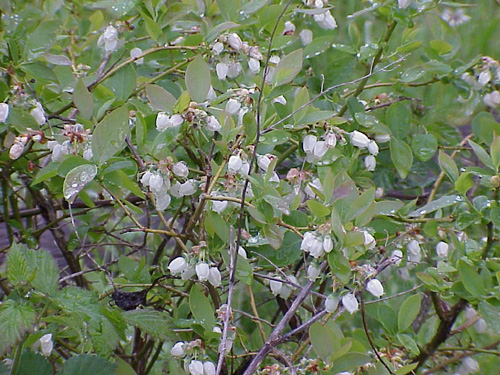
Blueberries in full bloom.
(*photo by Sally Ramsdell)
May 9, 2010 Planting
the Gift of Peace at Home
My
own peace I give you... (John 14:27a)
God is the ultimate giver of
all peace, and our role is to receive and preserve this precious gift of peace
within an atmosphere of gratitude. The peace that is given to us as gift from
God is able to expand; it is not so limited that it can only be sequestered and
grasped by a few. Peace is of infinite spiritual value, not limited material
worth, and so we have the responsibility to pass our individual peace on to
others.
Peace
that we receive into our hearts is allowed to sink in and rest for a brief
moment. However, this inner peace is fragile, and its growth potential depends
on how well we pick it up, mold it, and prepare it to be extended to others. If
we ignore peace or become too selective in what we attempt to do with it, the
peace is utterly distorted and lost. Friction results. On the contrary, peace
must be allowed to settle within our hearts, be recognized through prayer, be
nurtured through sacramental life, and then be extended as a gift to others.
Gift received is gift given, and being a spiritual gift it has infinite quality.
People crave a peace that
the world cannot give, and thus we turn within to peaceable people who recognize
God as the author -- these with spiritual insight are the ones capable of
extending peace to others. What we discover is that peace within our hearts is
able to be cultivated. If the heart of Christ is the source of peace, and if we
as loving members of the body of Christ constitute that heart in the world
around us, then our peace is meant to be contagious, to go out to all the
world.
Peace
comes through showing God's love and mercy as experienced by us and is meant to
be shared. Scripture tells us that we show this love through deeds and not
merely words. We need to requite or repay this love through loving deeds to and
for others. Jesus' farewell address tells us that we are to love as he loves us
and sacrifices himself totally for us. God prompts us to recognize that love
is already here, to accept it, and to allow it to break loose from within us
through our prayers, charitable deeds and sacrifices for others:
1) Sacrificing for others
involves letting them know that we pray for them and with them; Love is an
uncreated love, not a love that we fashion apart from God; we merely open
floodgates so that loving peace can move out.
2) Establishing peace in our
homes involves making the place one of love and peace. Let's prepare our homes
by following the promises made to St. Margaret Mary Alacoque, namely, if our
home is graced with the Sacred Heart picture that is placed in a prominent place
for all to see, peace will come to that place.
Prayer:
Lord, help us open our hearts and our homes for the beginning of peace in our
world -- starting at the grassroots, that is, in our interior hearts and in our
dwelling places.

English ivy vine and pink geranium
flowers line a not-so-busy walkway.
(*photo
credit)
May 10, 2010
Degrees of Humility: Thinking Globally
Our Earth all around us has
troubles, and we take note. Our senses detect unhealthy conditions that fly in
our face and that we cannot avoid. We have first a vague and then an ever more
encompassing awareness that something is amiss, first immediately around us and
then, through communication with others, we sense the entire globe is involved
to some degree.
St. Ignatius's Spiritual Exercises speaks of three kinds of humility.
The first kind is necessary for salvation, and involves obeying the law of God
and in no way violating the commandments that bind me mortally even to save my
own life. The second kind is more perfect and involves an attitude wherein I do
not desire riches rather than poverty, provided that in doing so I promote
equally the service of God our Lord. Even to save my own life, I would not
consent to do the most venial of offenses against God. The final and most
perfect kind of humility assumes the first two and states that if God is equally
serviced one would desire and choose poverty with Christ's poor, rather than
riches and even to be accounted as worthless and a fool for Christ -- because he
was thus treated. Christ is present in the poor, poor people and poor Earth.
The
first degree of environmental consciousness: Becoming green follows the
same patterns as does individual spiritual growth. We are moved to turn from
the misdeeds that harm our wounded Earth. If we are silent to polluting
practices, we are party to them. The first stages of environmental
consciousness in the 1970s and 1980s was seeing environmental harm and deciding
to say something about what was observed. However, often initial observation
made the damages stand at a distance from us, and merely seeing the damage,
voicing objections and calling for remediation seemed sufficient from this
initial level of awareness.
Denial
is not an option for us. Someone must act and halt the malpractice: air and
water pollution, deforestation, pesticide contamination, endangerment of species
habitat and extinction of species, toxic waste, and land erosion and mining
damage, to name but a few. At this first level, human irresponsibility stands
out, must be exposed, and a firm resolution made to halt these malpractices.
Specific laws, regulations and restrictions are imposed by governments at
various levels in order to stop air or water pollution, deforestation, or to
save the gray wolf or bald eagle. Actions on this level include current climate
change battles. In the process of acting, the conscientious person becomes
aware that the actions are imperfect. From the concerned citizen's standpoint
there is need to influence governmental agencies whether by citizen contact,
legal action or through citizen petition and lobbying.
Prayer:
Lord, help me to see the poor, the hungry, the suffering. I do not want to be
lost due to insensitivity, which is a mortal fault. Help me accept my citizen
responsibilities and move to deeper levels of awareness.

Flowers of the chive plant.
(*photo
credit)
May 11, 2010 The
Second Degree: Acting Locally
Individuals
abandon blatant forms of misconduct and approach those who have
suffered as victims. We move from merely seeing troubles and come
to realize that something ought to be done. My indignation goes
beyond blaming the distant culprit. I resolve that I must take
several types of actions: to help others change their lives; to
change my own life in some way. It is not enough to merely see
damages from a distance. Rather, by acting, my sensitivity is
heightened, my modeling catalyzes others to act, and my will power
is strengthened. My growth in environmental consciousness goes
beyond pinpointing environmental damage by others. I must do
something and help in some way.
The
second degree of environmental consciousness looks at the
personal need for assisting others; it involves going out to help
them in many ways: with housing, with feeding the hungry, with
servicing the sick, with environmental repair and with clean-up
operations. In the process of going out we find that we are
imperfect and the work is not done perfectly. Physician heal
yourself. Introspection ensues. We make some inner discoveries.
In part our imperfections stem from unrecognized privileges and use
of resources due to our current place in the world. Yes, I am
partly to blame for the conditions of the world around us: I use
resources; I fail to recycle; I travel much through inefficient
means. I contribute to the consumer culture in my use of
electricity, my mobility and my consuming goods geared for planned
obsolescence. Local involvement in change is necessary.
Excuse
is no viable option. I look down into the practices through an
audit of what is used at all levels of my consumer practice. An
entire world opens before me with many resource conservation
techniques: conserving water; turning off unused electronic devices
and unused lighting; driving energy-efficient vehicles or traveling
by public means or hiking or biking; engaging in less
environmentally-impacting forms of recreation; growing fruits and
vegetables and purchasing organic locally-grown food; turning lawns
into edible landscape, turning down heat in winter and cooling
devices in summer; and a host of simpler living techniques.
Simple
techniques consume time and effort, and after much study, practice
and interchange we justify this focus by saying it is sufficient.
Like-minded individuals can re-enforce our attention to individual
and local activities. In fact, the methods are so diversified that
new and better techniques are constantly coming to the fore and
information exchanged. Is this enough? A wider world is out there,
and our model living may be overlooked or only tolerated; others may
continue in their wasteful practices. We may simplify (a kenotic
revolution) -- but the world will not. Earth is not automatically
saved (presumption) nor damned (despair); hope of salvation rests
with a deeper spirituality.
Prayer:
Lord, give us ways to overcome our uneasiness with others in need;
show us how to reach out and help them.

A bed of iris buds, waiting to bloom.
(*photo
credit)
May 12, 2010
The Third Degree: Acting in Solidarity with Others
On
the third degree of humility, an individual seeks to be with Christ
in all that it takes. A solidarity embraces the crucified persons
in our world. While this level is quite plainspoken when it comes
to individuals, at the more collective level, beyond committed
intentional communities espousing poverty, this gets more
difficult. However, the present system is not working and joint
action must be taken. Any temptation to tweak the system is only
denying the urgency that each of us is impelled to espouse. The
need goes beyond the individual and a powerlessness prevails. Forms
of escape come to the fore: we must work within the system; we
cannot expect to accomplish much even as a committed community;
love makes us refuse to offend anyone and any push to the commons is
offending the privileged.
A
third degree of environmental consciousness is starting to
awaken. I see how little I can do alone and sense a growing need to
involve and join with others in a collective enterprise. We seek a
certain solidarity with our fragile sister Earth. We express this
in song, poetry, prayer, dance or other artistic and spiritual
ways. This deepest level may not be primarily a natural consequence
of the first two levels, but rather a major ingredient in the
relationship of primitive and nature-loving simple people to Earth.
To be one with the poor as a WE does not mean selfishly escaping to
an ever-shrinking natural wilderness; it does not mean being a
China, India or another emerging nation increasing its appetite for
material resources, the extraction and processing of which the
materialistic West has done for decades.
Escape
to our ever tempting allurements is no option; we cannot run from
what is before us no matter how difficult the task and how risky our
efforts at solutions. Today, poor Earth is threatened as never
before; the poor will suffer all the more and so true solidarity
means not seeing disaster or even hearing the cry of the poor, but
being poor and saying: "WE the poor" -- yes, poor people and poor
Earth. At this deepest level of environmental involvement, the
emphasis is on social justice. Earth's resources belong to all of
us, in a common good of which Benedict XVI speaks. Yes, we have no
room for economic and political systems that permit the
resource-using privileged few.
We
conclude that if we do not act now Earth will be severely damaged in
the long haul. We must propose and bring about a new world economic
system not based on material profit nor fostering greed, but rather
based upon fair distribution of essentials and avoidance of wastes.
Prayer:
Lord, make us see beyond simple individual acts and go to a deeper
level of organization, and thus set our goals at working to enhance
a system wherein justice may prevail upon our wounded Earth. Give
us the courage to act as a people to bring about the changes that
are due here and now.

Flower of the pawpaw (Asimina triloba) plant.
(*photo
credit)
May 13, 2010
Testifying to God's Presence
If
we believe that Christ is really present, then we are to present
Christ in a meaningful manner to our world. Christians often
profess in words their belief in the Lord's presence in our midst;
however, making Christ present in deed is a greater calling -- but
we can also do that. St. Theresa of Avila speaks of our being hands
and feet of the Lord -- through deeds showing belief.
The real presence in
the Eucharist is a matter of adoration, for many of us believe
through the eyes of faith that Christ is present. Our liturgical
Eucharistic Consecration changes the bread and wine into the Body
and Blood of the Lord. For those without this sense of faith this
action seems almost laughable. However, we must reaffirm that this
is not only ecclesially- and biblically-based from the time of
Christ's earthly ministry, but that this faith act continues
unbroken through apostolic succession and priestly commission. The
Lord is with us, a reality that grows with each Mass; the Calvary
event continues in space and time. Through faith, this Presence
gives reality to our present moment, a coalescing of past and future
into the sacred NOW.
The
past includes the Calvary event of two thousand years ago. It
was in historic time and one grand happening. However, this event
transcends time and thus is made ever present by our liturgical
participation. We accept the sufferings of the past and the
yearning of ancient Israel for the Promised One. The past is thus
fulfilled with each passing day and our Liturgy extends that
fulfillment with our participation in the sacred HERE.
The future
hoped-for coming of the Lord is included as well, an anticipation of
the definitive coming of the kingdom of God when Word is presented
in a formal manner. The Word was born and became one of us in the
Incarnation; the fulfilled Word will come again at the end of time
to gather us all together. The one who came and lived, suffered,
and died is the one who rose and went before us in space and time.
It is the Christ who was and will be Lord of the Universe, who is
among us and is made present by our faith- and hope-filled deeds
performed in the present moment of love. Since God is love, our
loving deeds present God to the world around us. We are the ones
who believe and hope, and thus are the ones who love what we hold
dear from past history and future promise.
God
is Love with or without us, and yet we know in faith that divine
love spills over into us and allows us to be empowered to love in
turn. To profess faith with no love is meaningless and the same
applies with hope as well. Living our faith and hope can only be
done through loving deed, when Word generated goes forth to all the
world through what we are and do. In this manner, we become a
trinitarian manifestation of God who creates us, who redeems us and
who inspires us to extend love to others. Our own oneness in faith,
hope and love testifies to the oneness of God; our loving deeds make
this oneness known to others so they too may love.
Prayer:
Lord, let us make your presence known through loving deed as well as
word.

A surprise (unplanted) guest at the
garden's edge - a brassica.
(*photo
credit)
May 14, 2010
Facing Reality as a Deepening Spirituality
That
voice is round me like a bursting sea:
"And is
thy earth so marred,
Shattered in shard on shard?
Lo, all
things fly thee, for thou fliest Me!"
"The Hound of Heaven," Francis Thompson
We
know people who overspend, overeat, overdo or indulge in one or
another substance; we seem powerless to do anything about it, and
yet there may creep in upon us a righteousness that at least on this
matter we are better off. We may dismiss their problems with "They
can't face reality." That may be true, but the lack of facing
reality confronts more than a few. We are all in a culture sated
with material things and enamored by the quest for comfort. We are
a country of drugs and drug advertising; as a culture we lack a
sense of abstinence; we indulge in promises of future fortunes; we
champion fiction and gaming; we are destitute of ways to handle
reality. In fact, some would chide us for trying to get folks to
face reality: "How can you be so cruel as to confront them?" Their
ways become private affairs.
Facing reality
extends to our nation as well as our neighbors in our local
communities. If we know relatives and neighbors who are going
bankrupt, what about our nation's spending habits and our own needed
commitment to civic responsibility? Wake up! We as a nation are
living beyond our means, and we seem so powerless to act. At the
moment this was being written (in February), our Administration was
allowing loan guarantees (really loans) for nuclear powerplants that
are costly and risky -- all because of the power of corporations and
lobbying efforts. Facing reality is part of anyone's spiritual
health. We need a deeper sense of the hard knocks of life, the
suffering to be expected, and our shortness of time. Reality is
stark but, when truly faced, it has a surprise -- God is present in
our midst when we face up to reality.
Fiction
is all too popular; so is laying out elaborate plans that go by the
wayside. Shorter-term realistic planning is sparse. We need to do
real things that count: be humble, refrain from overusing, conserve
resources, cut back on improperly defined "needs," look for more
than material profits. People thrash about for material security
and it evades them. We all have those moments when the car stalls,
the house is filled with smoke, a friend comes down with cancer. In
all, we stumble upon reality when least prepared, and then must face
it or continue fleeing from it. Ben Franklin said that it is good
deeds, not good words, that count. Deeds involve the healing that
comes in facing reality with prayer. We are not alone; we have God
to help us. If we are drinking too much, we can stop with God's
help. If we cannot start or get involved in a task, we can start
with God's help. We resolve to do more than make a promise; we
step forth and come face-to-face with reality, and therein act
accordingly.
Prayer:
Lord, fortify our resolve to see what is before us, and, in seeing,
to find you from whom we have been absent so long.
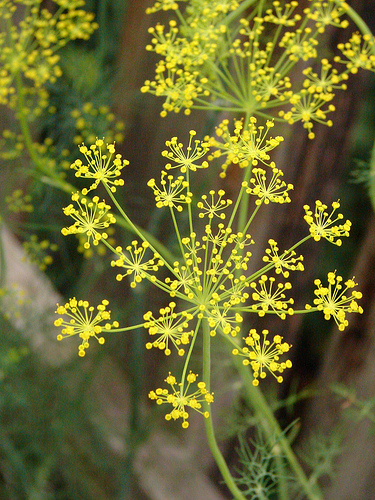
Flower of the dill plant.
(*photo by Jon Hayes)
May 15, 2010 Selecting Dill as the Herb of the Year
You who pay
your tithe of mint and dill and cummin and have neglected the
weightier matters of the Law -- justice, mercy, good faith!
(Matthew 23:23
Why mix
profound reflections with a mention of the lowly herb dill? Are we
not belittling major problems facing the human race and our wounded
planet? Don't we seem to tithe time and space for herbs and forget
about focusing our reflections on justice, mercy and good faith?
Simple-living folks may attempt to address these questions
differently, but my major reply to the focus question is --
"cultivating and enjoying dill helps prepare us to spend quality
time on weightier matters."
Lowly
dill has no medical properties of great moment though some can
testify to its good effect. Nor does dill have a special place in
one or other grand culinary delight, but has the commoner quality of
being liked in many simple ways. The taste seems to grow on
people. I like dill in ice cream, but does that qualify? Dill is
enjoyable, and we need simple joys in a problem-filled world.
Besides, dill has a long history of being enjoyable in ancient and
Biblical times through the Middle Ages, and right down to today.
Dill has staying power.
Those of us who belong to herb clubs, like our Estill County one,
hear about a different herb each month. Over time we get acquainted
with many varieties. However, we also have a "herb-of -the-year,
when we reintroduce ourselves to one of our kitchen- cooking herbal
family members. Dill has the honor for the year 2010. Compared to
many of the other herbs needing special care, dill is easy-going and
easy-growing. Seeds germinate well; some can come up from the
previous summer; the plant comes to seed in mid-summer and then a
second crop can be produced that can be saved in pots in a
greenhouse for winter use. Protect in autumn, for the plant is
quite susceptible to cold weather.
Dill
is so much a part of menus that it can be overlooked. Besides
popular dill pickles, we have dill throughout much of the growing
season and thus insert it for special flavor in many soups. I did
not specifically mention it among the 365 varieties in our "Special
Issues" due to omitting seasonings. I like putting herbs in
cornbread and have found dill to be a favorite. Dill always adds
excitement to cooking and so creative herb lovers slip dill into a
host of stews, sauces and soups. I sprinkle fresh dill into
twelve-variety, mixed green salads creations. When plentiful, fresh
dill is a regular addition; at other times dill seed suffices. I
add dill to raw sauerkraut as a salad variety (await listing in the
"Special Issues" at the end of 2010). Fresh dill or seed can be put
in vinegar for salad dressings. French cooking includes dill in
pastries, cakes and preserves of various types. Dill goes well in
many dishes and thus truly deserves to be the herb of the year.
Prayer:
Lord, help us keep from being dull through dill.
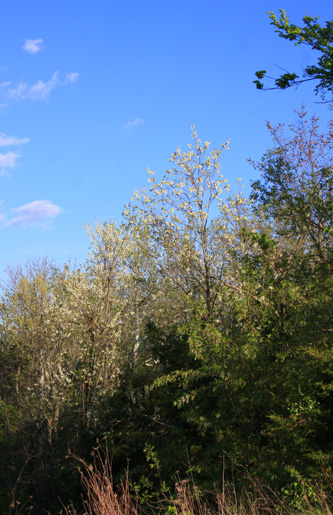
Blossoming trees of spring against blue
skies.
(*photo
credit)
May 16, 2010 Celebrating
the Ascension
Why
are you standing there looking at the sky? (Acts 1)
At
the time of his ascending into heaven the risen Lord invites us to
become his hands and his feet in the world around us. Our
participation is one part of the mystery we reflect on today, all
parts of which are interconnected:
a) The Lord
ascends in glory;
b) We become
participants in the glorifying process;
c) The age of
the Spirit begins through inspiring us to act.
Jesus Christ has
moved among us, suffered, died and risen. With the completion of
this phase he departs as would a loved one and friend. He ascends
into the glory of heaven. Sadness overcomes those who are in his
company, and yet it resembles all departures of friends, a
bittersweet event. Christ ascends so as to reign in heaven -- but
the reign of one who is a suffering and serving Messiah. Jesus
hands back to his father the redemptive accomplishments he has
wrought, a definitive act in the salvation of the world.
Christ's
departure is part of our maturation. His physical absence now
allows us to take on the important work that he has called us to do,
and that the disciples are to put into motion through the
establishment of the Church and ministering of the sacraments. We
are not left alone, and so we launch into our work as part of the
Family of God. The Ascension opens the way for our own ascending in
power to perform work needed here and now.
The
Holy Spirit comes among us in this new age. We are inspired through
the act of divine Love to go out and assist others in some fashion.
We become messengers of God's Word through a maturation process.
The Kingdom now founded must be given full root and flourish and
here the Spirit directs and encourages us to do what we are called
to do. In this age, the Spirit shows the glory of God manifested in
each individual who obeys God's will and contributes to that divine
mission.
Just
as the disciples vainly expected a military messianic event even at
the moment of Jesus' Ascension, still the Pentecost event ten days
later opened for them a new and spiritual understanding. So with
time and the graces of our Baptism/Confirmation we are open to
growing and maturing in the mission still ahead of us. Spiritual
privileges are bestowed on us; we are to announce justice to the
world. We accept local tasks but must move on to help bring justice
to the world. We are to establish the new global Kingdom as a
spiritual and civic duty.
Prayer:
Lord, help us to accept the invitation given to carry on Christ's
work. God operates through us and not in distant and only
miraculous ways. Make us realize our unique roles as participants
and inspire us to carry on the work Jesus initiated while in his
public ministry.

Dwarf larkspur, Delphinium tricorne.
(*photo
credit)
May 17, 2010 Using
Tools Properly
I
once knew a crafty old farmer who would ask the aspiring worker to
go pick up the shovel or hoe and bring it to him. He testified that
he could tell how experienced the candidate was by the way he picked
up the tool, how familiar he was with it, and how well he gripped
the handle and balanced the implement in his hands. I remember
that farmer when I ask people to pick up hammers and spades.
However, I caution myself for some act improperly, but they are
earnest and learn faster.
A
picture in a recent issue of the periodical "One" shows a farmer in
Ethiopia, and from the way he positions the scythe (parallel to the
ground) I know he is an experienced farmer. There is a knack to
handling every instrument -- and that applies to everything from a
tennis racket and baseball bat to a concrete trowel and level, from
a keyboard to a cello. There are ways that make the task easier and
more accomplished, and good teaching and observation make these
practices teachable. However we must also be tolerant in allowing
for handling peculiarities by some.
This
story goes beyond crafts and arts and extends to the way we run our
households, whether domestic, regional, or national. The economic
tools at our homes include everything from a check book to credit
cards, from light switches to cooking devices. Our cars can be
regarded as instruments of travel, and these also are handled
differently as are cell phones and iPods possessed by drivers who
are tempted to multitask. We learn with time that we must attend to
each task in order to succeed. Do we show such care in our domestic
and community relations?
On
a national level, the tools of state include administrative
regulations, legislative measures, and use of powerful military
weapons. Tax revenues are instruments as well that can be used
justly or unjustly. Where does an aroused citizenry demanding
fiscal responsibility fit into the picture today? Why the massive
military budget? Does it render perks to most congressional
districts, rendering legislators paralyzed to make needed cuts?
We
must handle all tools with care, knowing which ones we can use
properly and where we should look for the ones who can use them
better than we can. It takes grace and humility to realize the need
to detect, learn and discern what is needed to create an efficient
labor force. One bit of tough love: beware of the inexperienced!
One unskilled person with a hoe can ruin a garden quickly by
chopping out plants, loosening soil near them too much, or omitting
the weeds that need to be attacked. Our unpleasant task may be to
divert the inexperienced to less damaging work. We need to persuade
some to defer to others. Encouragement must be given to each, once
they have proper tools and instruction.
Prayer:
Lord, we are tool-handling creatures; guide us in our choice and
use of them, so that the world will be a better place through the
works we perform and the workers, artists and crafts people we
encourage and support.

A burst of blue in Mercer Co., KY
forest.
(*photo
credit) May 18, 2010 Failing
to Face Cultural Bankruptcy
And they [Cities] will be
swept away by various kinds of destruction: some will be ruined by wars. others
will be destroyed by idleness and a peace that ends in sloth, or by
luxury, the bane of those of great wealth. Seneca
A few years back, I sent a
donation to a colleague who had started a small non-profit organization in
Appalachia. However, his plans did not seem well formulated and so I asked him
how he was to keep the new office functioning. He replied, "I have a credit
card." Though I held my silence (while his group struggled), I should have
said, "This is the mentality of why I don't have a credit card." Living on
credit fosters a fiction that the brighter future will erase all debts, and that
sources of income will happily arise out of nowhere. Paying off credit debts is
beyond people who live in the world of pretending.
Fiction-writing
is so popular -- and lucrative -- that I am tempted to shift to that pursuit.
Why not tell within a gripping story about the rottenness of the credit
mentality and how we live unsustainable lives on the sure road to cultural
bankruptcy? There is plenty of ammo for such stories: one-third of a million
foreclosures occur per month; credit card fraud and identity theft abound;
people make choices between fixed bills and health insurance; European nations,
states and cities stand at the brink of default, and yet their streets are
filled with citizens defending their overpriced positions. Maybe the fictional
story should be of people craving change, showing dissatisfaction with those who
are materially privileged, and calling for a new economic order. Is the reason
we hesitate to change because we still believe in storybook magic or, as the
selfish elders among us think, because the chickens will come to roost after
they die?
The
truth is always that reality is stranger than fiction, and quite often more
interesting. However, few want to delve deeply and would prefer to stay in the
comfort of fictional living that distances the reader/viewer from immediate
reality. Our illusion within our materialistic culture is that we can conquer
cultural problems through sufficient material techniques and resources.
Children's stories mesmerize adults who prefer books of fiction, novels, and
network sitcoms; we fail to abandon unsustainable living practices. We fail to
see the need for longer-term solutions; something is out of place, is askew, is
missing.
Culturally
we must change; we simply cannot continue the policies leading to ruin. Are we
really so powerless? Can we not stop before it is too late? Can we confront
the cultural greed and covetousness leading all to ruin? Can we halt the
unsustainable practices of the affluent bonus-takers who deserve to be in jail?
Prayer:
Lord, shake our collective being in such ways that we doubt the fiction we
popularize; give us the courage to face the truth that stands before us; turn
hearts to spiritual things.
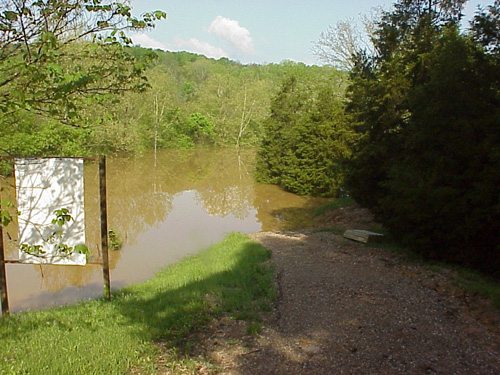
May, 2010 flooding in Eastern Kentucky.
(*photo by Sally Ramsdell)
May 19, 2010
Confronting the Drug Culture
When
you see more drug reps than patients in a doctor's office, you know something is
wrong. (An astute patient, 2010)
In 1910: Doctor, must you
give me this drug to take? I do not like to ingest any foreign substances.
In 2010: Doctor, you must
give me this drug to take. I saw it advertized on tv. I forgot the name but it
is the purple pill.
Americans
have problems with drugs on the individual, local regional and national level.
In fact, this problem is not uniquely American. Note that there are poppy
growers, coca gatherers and mafia cartels in many nations. Even with all the
wars on drugs the business of drugs is booming. Part of failure is the
permissiveness of a culture that advertises legal drugs, glorifies consumption
in virtually all its forms, encourages greed, makes money into a god, and never
confronts the dangers of excessive use of just about anything. Addicts abound
and most think they are still rational enough to make informed choices, while
addiction extends to illegal and legal substances, from narcotics to anabolic
steroids.
America is home to less than
five percent of the world's people, and yet our people consume two-thirds of the
world's antidepressants (one-eighth of our people take Prozac and that is
only one of thirty depressants). Over three billion dollars (2005) is spent by
Americans on the medicine Zoloft alone. Numerous drugs are widely
advertised; patients pressure doctors for prescriptions. Most of us might be
inclined to say, "But that is a rare happening." Really? Earlier this year,
in the BBC interview with a celebrity physician at the time of the trial of the
doctor who treated Michael Jackson, an interesting answer emerged. When asked
whether doctors are badgered by patients, the interviewee said that it happens
all the time. He spoke of "doctor-shopping," or moving from one to another by
those with drug-seeking behavior; they hunt for willing dispensers and even
threaten those who do not comply. Unfortunately, they find the obliging medical
person who will try to satisfy them, but drugs do not satisfy.
Face
it! We have become a drugged culture; we grope for the remnants of rationality
and solid hopes and stitch these together to reconstitute a healthy society.
Drugs are an illusion, a fiction of our culture, the inherent limitations of all
material things that call for more and more. It is as though the quantity will
keep the process functioning. We are drugged even by the dollars that seem to
say, "The more the better." Material profit motivation fuels the drugged
culture; it builds on itself with a craving for things illegal or legalized by
those who captivate our law-makers. Citizens and health professionals are
caught in a struggle going far beyond drugs and the production, dispensing,
advertising and transporting of legal and illegal substances.
Prayer:
Lord, help us to see and address the real situation. Keep us free from
drugs and help us liberate those held captive.

Taking a break to enjoy warm spring sun.
(*photo
credit)
May 20, 2010
Contrasting
Material and Spiritual Privilege
We
often mention the "privileged few" versus the great numbers who lack material
means, the ones who satisfy wants with impunity and the needy caught in the
drought of basic needs. To allow this condition to continue is a SIN of our
culture of which we must realize, confess and make amends for. As stated in
"Reclaiming the Commons" on this website, such a condition of wealth for the few
and poverty for a widening majority of people, will damage and destroy the
cherished but fragile democratic spirit. As responsible citizens, we must
challenge wealth becoming power, power becoming access, and access making
possible influence; thus the materially privileged have become de facto nobles
who can purchase laws that enhance their privileged status. Through media they
influence irate citizens with the mantra, "No new taxes," and turn them into
lemmings rushing to the sea of national bankruptcy.
On
the other hand, a spiritual privilege also exists that is unlimited in nature, a
gift given in our sacraments by a generous God who creates us and sets us apart
to bring all together. These gifts are not short-lived and unsatisfactory;
they have eternal duration; they are not exclusive but are directed to
inclusivity of all. Good News reaches the ears of the condemned prisoner,
slave or beggar and eventually to all the poor, for spiritual privilege is for
all, not a few. Let's make it reach everyone! The future is an unlimited
horizon, and the insight is itself a grace.
Spiritual
privilege involves being the first to see the spiritual dimension, not becoming
the few who are allowed to see it. This graced privilege of first in time does
not mean to stop at this point; we must invite others to enter the limitless
sea of God's Love. Being first only means being first to invite others, not to
knock others out of a limited competition. This is why a privileged ability to
see ahead is a gift that exists with awesome responsibility. Sharing overcomes
any desire for exclusive possession -- and this is why a materially tainted
spirituality is so harmful. We receive a spiritual privilege to share; service
is inherently a refutation of exclusive "spiritual privilege" that leads to
self-righteousness and a blinding insensitivity to others.
A
distinction is in order: we condemn material privilege in a world
of haves and have nots; we affirm spiritual privilege that involves
confronting the materially privileged. We do not rest and excuse ourselves by
saying that material privilege is a facade, which in the long term it is.
Rather we must condemn the status that makes so many aspire for the limited
material resources controlled by the few. From a citizen and democratic
standpoint we cannot permit unlimited material privilege, or the power of those
who have to continue getting, letting those without remain in their
destitution. Material wants are fueled by an inordinate greed. Confronting
this vice is our duty as suffering servants, becoming vulnerable for the sake of
others.
Prayer:
Lord, thanks for spiritual privilege to see ahead.

Butterfly on fence at Fr. Marquette
Memorial, MI.
(*photo
credit)
May 21, 2010
Challenging Talents Turned to Material Privilege
All
of us are privileged with certain natural and cultivated gifts: intellectual,
athletic, artistic, etc. A few are Beethovens and Handels; while Mozart died
penniless, many of the talented are now being privileged in monetary ways. The
early Greek athletes received a non-monetary crown of laurel, but modern
athletes receive more than laurels and gold medals. Money, big money looms just
over the horizon. Our materialistic culture goes farther; gives the winners
perks. Why is Tiger Woods, a talented golfer, a billionaire? Is it simply the
road from talents-recognized to material privilege?
We
admit that the presence of a gifted individual does not mean another person is
entirely bereft of gifts, only that society does not place equal value on all
talents. All of us are to know our gifts and to help others find theirs for the
sake of the common good. The difficulty is that in a materialistic society,
people place value on certain gifts and then reward the celebrities with
advertising contracts and other monetary awards in order to knight them with
material privilege.
Those
who should be teaching spiritual values often mix the goals of material and
spiritual privilege. Is the intellectual on a road through privileged
institutions of learning to positions of privileged power and wealth?
Intellectual or artistic talent is recognized and granted material privilege.
One easy answer is to allow the material awards to be given, but to subject them
to virtually total taxation. People may bask in becoming instant millionaires
or billionaires, and then watch in satisfaction as their awards are
redistributed through the power of fair taxation to those more in need.
Prosperity
is regarded by some as a mark of spiritual growth. Fools certainly rush in
where angels fear to tread. Thus these prophets of profits concoct examples as
Jesus dining with the wealthy, or wearing a seamless garment, or being given
Magi gold. The leader of a "prosperity church" struts on stage with diamond
rings and travels by private jet to the next glittering event. This is a
natural outcome of those who hold a perverted view that material prosperity is
the mark of success. It is ever so tempting! Akin to material success is the
tolerance of those who are privileged either by royal blood or material wealth;
they are permitted to remain wealthy, provided they give (at their own
discretion) a portion to the destitute and poor. Material privilege must never
be justified as an opportunity for spiritual growth through charity. What a
perversity! We need to purge this world of such misunderstandings and prepare
it for a radical sharing of wealth, whether freely done or enforced by proper
regulated taxation.
Prayer: Lord make us
radical enough to resist the temptation to material success, and strong enough
to challenge others who succumb to spending quality time acquiring wealth.
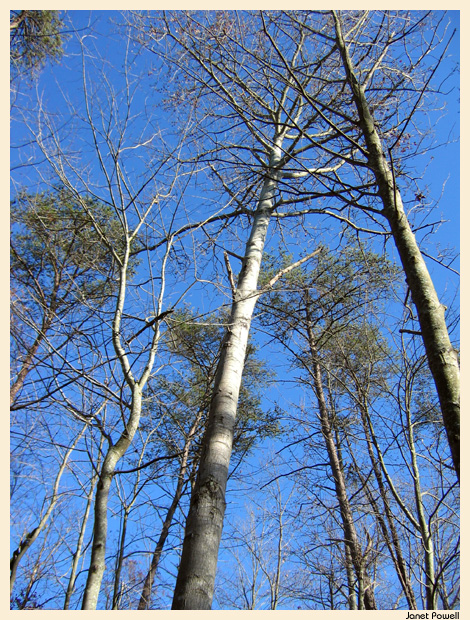
Rowan Co., KY. Quaking aspen, Populus tremuloides.
(*photo
credit)
May 22, 2010 Revealing
the Mixed Mesophytic Forest
Residents in forested areas
tend to overlook their near-at-hand treasures. Affirmation comes in celebration
and appreciation of forested ecological gems. Those who want to extract timber
or coal from these priceless commons often deliberately suppress the value, so
that what they extract goes virtually unchallenged.
Our
forested gem, the "Mixed Mesophytic Forest," stretches from southwestern
Pennsylvania to northern Alabama, and includes the Appalachians and Cumberland
Plateau. The name of the forest was bestowed by noted botanist and ecologist,
E. Lucy Braun (1889-1971), who amassed some 12,000 plant species in the course
of her lifetime. "Mixed" refers to thirty plus canopy trees that appear in
predominant patterns and are thus called oak-hickory, beech-maple, oak-pine,
etc. This forest is a relic of the ancient mesic forests that once covered much
of the temperate regions of the Northern Hemisphere; it escaped the last ice age
and thus is the world's oldest and most varied temperate forest. It contains a
rich understory of fungi, ferns, small trees and shrubs, herbaceous plants, a
multitude of wildflowers, and a variety of animal wildlife species. For
millennia the region has abounded in elk, deer, bear, wolf, fox, snakes,
opossum, raccoon, beaver, rabbit, turkey, and some two hundred species of
migratory or resident birds. Creeks teemed with varieties of fish and crayfish,
frogs and salamanders. Behold a treasure!
Mixed Mesophytic Forest
Verdant
ancient garment of America's East
Oak and
hickory-stitched, chestnut deceased,
spring flowers,
refreshing showers, and firetowers,
elk, bison, deer,
geese, and the Indians cry "Ours,";
while trailblazers
say, "My gun empowers."
Remnant of a distant
past,
you did survive the
glacial mast,
but can you now
outlast pollution's blast,
or timber worth more
than price of land
or off-roaders who
grand stand this grandest stand?
We
know how different axe and chainsaw sound,
one hacks and thins,
the other mows it all around.
Trees can regrow,
but forests don't rebound
from traffic flow of
loader, skidder, dozer,
justified as
canopy's exposure -- true foreclosure.
"Shelterwood's"
the Forest Service name,
but rape's the
same however came,,
even to the
non-virgin and the tame.
Crashing
trees release a made-made breeze,
and in an instant
the wildlife flees.
Must this mighty
forest cease?

White stonecrop, Sedum album, in Woodford Co., KY.
(*photo
credit)
May 23, 2010 Pentecost: Spreading the Good News
The
spread of multimedia communications and its rich 'menu of options' might make us
think it is sufficient simply to be present on the Web; [We are] challenged to
proclaim the Gospel by employing the latest generation of audiovisual resources..
Benedict XVI
World Communications Day,
January 23, 2010
At
Pentecost, more than at any other time of the year, we are reminded to go
out and spread the Good News. This spreading means "communication," and today
it is coupled closely with the modern Internet. Through modern communications
what was distant and foreign is now present in our living rooms and offices.
What was once, a year away by sailing ship, is now an instant removed through
email. We connect with others, at a closeness never before perceived in the
history of the human race. We are privileged and we show our sense of
responsibility through gracious interchange.
Spreading
Good News has gone through many stages in the two thousand years since that
first Pentecost event. In the infant Church, people spread Good News through
use of the excellent Roman road system, and so small communities of faith sprang
up throughout the empire in a relatively short period of time. Through the
centuries and after many ups and downs, Good News has spread to outlying
barbarian lands --Celtic, Slavic, Scandinavian, Dutch, and then on in the East
to India and even to China. Through heightened travel and navigation, at one
time or other much of the Eurasian land mass received Good News to some degree.
Then the Western Hemisphere, Sub-Saharan portions of Africa, and finally the
far-flung isles of Oceania were receptors through missionary efforts.
Today,
the extent of territory has been covered to some degree, but qualitative
penetration is still occurring. The Good News continues to go forth and touch
every valley and hamlet, but it must also be able to penetrate the hearts of the
hearers, or at least become an opportunity for them to hear. The complete
spreading of Good News is as yet an incomplete task. On that first Pentecost we
are told that large crowds received the basic message in their own languages.
Amazingly, the content of Good News has not changed: Christ lived, died and rose
for us. All who can ought to spread the Good News as best they can; all need
opportunities to hear the message. The language of the Good News must be simple
so that it is translated accurately and with full meaning; the message should
be straightforward and express the urgency of the times; the thought ought to be
able to be comprehended.
However,
mere hearing is the beginning and not the end. Anyone who hears and receives
the message must then carry on by working in and through the worshipping
community to encourage those appointed to render the message all the more
penetrating.
Prayer:
Lord, give us the grace to spread the Good News, to see opportunities when they
arise, and to use the Internet and all means possible to achieve these global
goals.
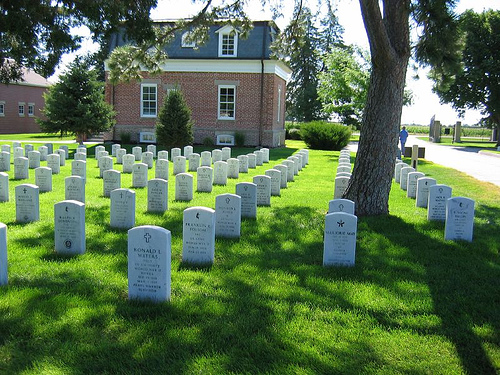
Fort McPherson National Cemetery.
(*photo
credit)
May 24, 2010 Decorating Graves of Loved Ones
As we approach Memorial
Day weekend, we try to show respect for those who have passed on and were so
much a part of making us who we are. This year my siblings and I are
celebrating the hundredth anniversary of the birth of our mother in 1910; she
wanted to celebrate that event with us, and she came within five years of doing
so. We planted a rosebush at her grave, which practice is allowed in the very
obliging St. Patrick's cemetery that holds the remains of our parents, four
grandparents, and two great grandparents, plus scores of uncles, aunts and
cousins. We were also able to place daisies on the grave of our maternal
grandmother who said, if nothing more, just put some daisies on me.
It was good to connect on
this one occasion. Many mobile Americans are distant from their homeplaces and
only return on rare occasions. Many do the second best thing and decorate
graves with artificial flowers that endure the summer sun and give a sense of
color and care to cemeteries. We realize that many Europeans but few Americans
actually cultivate a grave site with flowers and tend these during the year.
Others seek help from those living closer to the site and ask them to go and
decorate graves as a gesture of good will.
Memorial Day weekend is not
just the beginning of summer events; it is a time of serious remembrances, of
visits and home comings, of picnics and graduations and departures. We pause
for a brief moment and remember those who went before us. We pay our respects
and that is meaningful in itself. Next to our paternal grandparents' plots is a
very fruitful pear tree, and I think they would enjoy the fruit, for they came
from Alsace and appreciated pear trees there. In Europe, when a grave ceases to
be decorated, it may be declared abandoned and reused. Fortunately we have
enough land in most parts of America that this is not considered a necessity at
this time.
Our American roots go way
back in history. Much sweat and care went into bringing us to where we are, and
we recognize this fact each time we revisit an ancestor's grave site and
remember him or her in a prayerful manner. Each visit does much for us, for our
links to the past are forged through respect -- and time has a way of eroding
the bindings. Our links also need to be passed on, for we bear the
responsibility to our offspring to transfer some of that respect to them.
Graves have ways of quietly recalling for us the love that was generated over
time and continues in our lives. It is not sufficient that some (whether
neighbors or elders) do the task of visits for us; we have to make the
pilgrimage on occasion, for we need the reminder that we live and die a little
each day. By distancing ourselves from our ancestors we can easily forget the
history that gives so much meaning to our lives.
Prayer:
Lord teach us respect that includes those living among us and those who came
before and have now passed on. May they who live be respected and may those who
rest in peace be seen as living also, eternally, all wrapped in one community of
love.
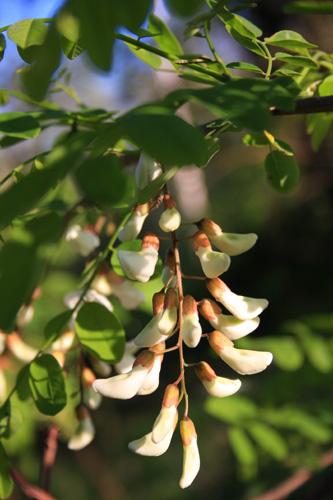
Flower pods of the black locust (Robinia
pseudoacacia) tree.
(*photo
credit)
May 25, 2010
Reflecting on Ecotourism in Appalachia
Like
all parts of the United States, the Appalachian region is desperate
to discover ways to entice and promote new business in these hard
times. The beauty of our region with its scenic rivers, forests,
caves, gorges, natural bridges and cliffs makes it a prime
attraction for visitors-- and these scenic resources are potential
business opportunities, provided the resource is not damaged by the
business operation. One such opportunity is ecotourism, that
is, the practice of inviting people to come to enjoy ecological
attractions and to act in a non-threatening manner. Sightseeing,
the number one tourist activity, accounts for about forty percent of
all tourism in America, and is a worthy candidate for being truly
ecological. Some tourist activities like hiking impact the
environment only slightly; others such as off-road motorized
vehicles can prove quite harmful if regulations are not enforced.
Tourism
is the region's third largest business and source of income, and it
holds an even greater promise for poorer regions, provided competing
for tourists does not lower environmental standards. Central
Appalachia is poor and has ecotourist potential, and is susceptible
to such temptations. General tourism, with its heavy carbon imprint
through air travel, can prove a mixed blessing. However caution is
needed for along with income could come: unplanned development;
disregard for local customs; mass-produced and cheapened crafts;
underpaid services by poor locals seeking jobs; and subtly dictated
the suppression of local culture.
For many years,
our region has been beset by an influx of motorized vehicles that
traverse at will both public and private lands in the guise of
"ecotourism." Pressure builds with these types of recreational
activities because equipment makers see sizeable profits. Special
recreational interests such as the National Off-Highway Vehicle
Conservation Council (NOHVCC) create a myth of ecotourism through
advertising pressure and some guise of responsible practices.
NOHVCC also gives scholarships to Marshall University as part of
this "good neighbor policy" that includes a host of trails on
reclaimed strip mine lands.
The goals of
responsible environmental groups who desire to control motorized
recreational vehicles are fairly straightforward: maintain the
integrity of our public and private lands and especially fragile
areas; prohibit such vehicles where they come into conflict with
natural resources, wildlife, roadless wilderness areas, wildlife
habitat, air, water, vegetation, landscape, solitude, natural quiet,
and archeological and historical sites; allow them only on
designated roads and routes, with all cross- country off-road
vehicles prohibited; and allow motorized water craft only on public
waterways where these vehicles cause no measurable ecological
impacts or human conflicts.
Prayer:
Lord, teach us to always treat our world with due respect,
especially when we seek to enjoy nature's vast resources.Move us to
make all of our recreational activities green.
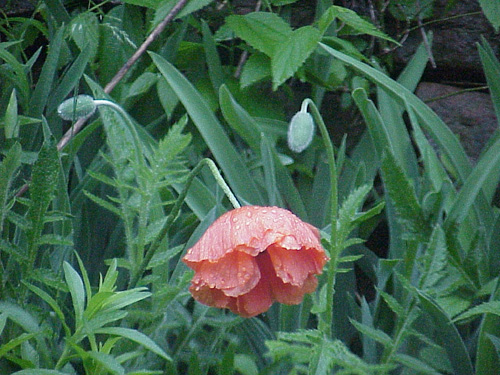
Poppy in rain.
(*photo by Sally Ramsdell)
May 26, 2010
Exposing Greed as a Vice
Some
call greed the catalyst, fuel and lubricant of our economic system
and market economy. Greed, the excessive desire for more
goods on the part of individual "consumers," is expected to stoke
economic growth expressed as Gross National Product (GNP).
Estimates are that about seventy percent of that growth is
contributed by materially satisfying individual consumer needs and
wants. Needed food, water, lodging and fuel are one component;
wanted higher resource foods, luxury use of water, spacious homes
and private vehicles are another. The first is a vital necessity;
the second can be a resource-wasteful luxury.
While
current world economy tolerates a relatively small number of
privileged individuals with extravagant habits, the ultimate
unsustainability of such a system becomes clear with time. When
their numbers and impact of the privileged were smaller, material
privilege appeared more a blessing than a curse; it was the goal
that the poorer folks strived to reach, as well as a comfort for
those who had attained the goal to some degree. Only in a closer
look at details do we see that some in richer places hog the limited
resource pie, and others are virtually excluded. However, the story
becomes critical when millions of Asian and Latin Americans seek to
imitate Europeans and North Americans in achieving private motor
vehicles, resource-intensive foods and more spacious homes. The
contemporary material aspirations include both essential and luxury
items for over six billion people. One billion of these are hungry
people and two billion lack proper living space. And there are a
million Haitian earthquake victims.
Greed
is stimulated by the consumer industry's advertizing and
material-profit motivation. Greed triggers the demand for more
cars, more spacious houses, up-to-date electronics, and all types of
prescription and over-the-counter medicines and cosmetics. Some see
the inevitable dangers ahead and define responsible consumerism as
tweaking the system through resource efficiency. Others are
starting to see that an uncontrolled material greed can spell doom
to our planet. They are speaking up for "contrasumption" or the
direct assault on our runaway consumer-based economic system.
However, when this new system is placed in material terms, it will
never gain popularity. When people attack greed fostered by the
Godless (not "godless," for plenty of material gods exist) culture,
they are marginalized, seen as ridiculous, and called unpatriotic.
In
our dysfunctional consumer situation, greed holds the prominent
position of being a virtue; this will continue as long as
profit-motivation goes unchecked, excessive wealth goes untaxed and
tax havens are allowed to exist with impunity. Promoters of this
culture turn "free market" into an oxymoron; they allow greed to be
an epidemic that sinks its fangs into the sinews of our culture,
sweeping up the athletic, the intellectual, the young and the old --
and they silence those who call greed a vice.
Prayer:
Lord, teach us to see the capital sin of greed in all its hidden
allurement; lead us to radical sharing of resources.

All in a day's work.
(*photo
credit)
May 27, 2010
Living with Daily Routines
We
can divide human beings into two groups: those who prefer routine
and those who live less formally. Most likely this distinction has
a long history, but clashes occur more readily when people live in
closer quarters, and life takes on a more frenetic pace. As we
become more mobile and time sensitive, we find the informal living
people are sort of an anomaly. Tight schedules and polished
routines go hand-in-hand. Some of us who budget time find routine
the great liberating element in our hurried lives. We soon parse
out times to pray, to eat, to exercise, to do certain types of work,
and to sleep. Granted, emergencies do arise that demand the
breaking of routine, but that is not normal. Routines are.
I
grew up on a small dairy farm and at least some family members were
expected to be at one or other of the two milking periods each day
before light in the morning and at dusk at night (plus or minus some
sunlight depending on the season). Yes, cow milking was a fixed
routine for us. Others who open and close stores, deliver
newspapers, follow the bells or whistles, or hold a regular job with
transportation schedules know all about routines. Amazingly, when
delving into the habits of primitive hunting and gathering cultures,
one finds that during certain prime hunting and gathering seasons
routines were essential.
Some
few "free spirits" strive to flee from or avoid routines -- and live
from free time to free time. They know that regularity is built
into everyday living and even into religious practice: church
services, days of fasting, and prayers at times during the day.
Those who think of themselves beyond such requirements also find
that they are distancing themselves from being effective in a world
that has a hunger requiring routine feeding of essential food every
day. Furthermore, they realize that love has its informality, but
it also requires a service based on routine. Those who say "My
world," intending to exclude other people, will most likely have a
shock on Judgment Day.
Hints
for improving necessary regularity include: accepting that all need
checklists when memory begins to dull with age or cares; keeping a
day book or weekly or monthly planner and using it; planning
tomorrow's tasks the evening before; following the schedule as
closely as possible but not being bound totally by it; giving ample
time between activities so as not to be late; developing
contingency plans for changes in weather or unexpected delays;
communicating ahead so that the parties in an upcoming event know
what you are doing immediately before; acknowledging that
irregularities have occurred and offering regrets even when you are
not the cause; and giving a final review at the end of the day.
Don't forget something else in a bow to informality: give yourself
some free time for celebration in spontaneous ways.
Prayer:
God who is the master of time, make us find our place in the limited
space allowed, and prepare us through routine for the possible
informality of eternity.

Eastern Kentucky sunset.
(*photo
credit)
May 28, 2010
Facing Mountaintop Removal Practices
If I look out
my window, I observe one of the nation's largest coal- related rail
switching yards. Am I disloyal in questioning coal as a permanent
source of fuel? Each day 110-car coal trains come from further in
the mountains, and these are turned over to other locomotives that
carry the coal to to powerplants in Florida and Georgia. Some of this
coal is deep-mined and some obtained by slicing down mountains
exposing and extracting layer after layer of black gold destined for
electricity generation. Coal is currently the cheapest fuel,
provided some critical environmental costs are deferred to later
generations.
We
are a people living off of future generations, and that applies to
credit, agricultural resources and energy supplies as well. As
climate change occurs and we experience summer and winter
temperatures that break previous records, we begin to see that
chickens are coming home to roost. We eventually must give an
environmental accounting for what has occurred in our world, face
the truth and move to cleaner sources of energy. To destroy the
mountains so others can have cheap electricity is not proper.
In the 1960s,
some Appalachians confronted the beginnings of surface mining by
attempting to block bulldozers at their front door, or actually
doing direct action against instruments used in mining. The force
of law brought these expressions of opposition to a halt through
threats and arrests. A more moderate approach came to the fore in
the efforts of the 1970s to enact surface mining legislation. These
new laws appeared successful at first, but soon the extractors found
ways around them. In recent decades, coal companies obtained entire
mountains and concentrated mining operations. Coal-containing
mountains resemble the layers of a cake. Why dip in only so far?
Slice off mountaintops and extract successive layers until the cake
is leveled and the valleys filled.
Opposition
to mountaintop removal has become somewhat vocal as the practice
continues to expand. However, these opposing voices have been
countered by miners wanting to retain their high-paid jobs and
industries that want their high-paid profits. Gatherings on this
practice have become quite emotional, for coal has a way of
triggering differences in opinion. Those of us, who seek a less
emotional and more appropriate approach, champion energy efficiency
and renewable energy sources: wind, solar, biofuels, geothermal and
tidal -- the first ones more appropriate for this region than the
latter ones. All the while, we also see the mountains as a valuable
resource for ecotourism (May 25th). We realize that coal remains a
source of energy for the immediate future both because it is
plentiful and because it can be easily extracted through current
technology.
Prayer:
Lord, give us a sense of respect so that we want to save the
beauty of our mountains; give us also the practicality and urgency
to implement fuel substitutes that make the shaving off of mountains
unnecessary. Help us usher in this new economy ASAP.
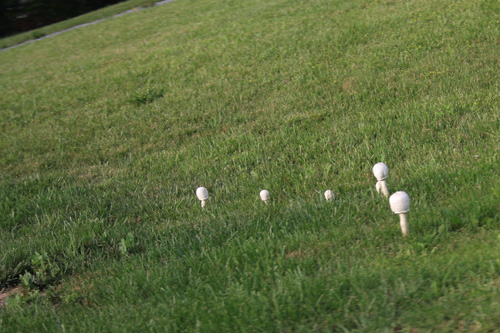
A "fairy ring" of mushrooms after an
extended period of rainfall.
(*photo
credit)
May 29, 2010
Saying Farewell to the Last Survivor of the Bo
A
news story in February reminded me of a breakfast conversation I
once held with an aging Latinist. I told him each time I hear of a
language ceasing to exist it makes me feel the same way as the
extinction of a certain plant or animal -- in this case a culture
ceases to live. He replied, to my astonishment, "Who cares?" My
weak reply was, "At least I do. In fact, my care includes the loss
of Latin also."
This recent story reported the passing of Boa Sr., the last
surviving speaker of the Bo tribal language. This Bo tribe was one
of ten distinct Great Andamanese tribes from India's Andaman
Islands. Survival International estimates that only 52 Great
Andamanese from all tribes are left, down from about 5,000 when the
British colonized the islands in 1858. The Bo are estimated to
have inhabited these islands for 65,000 years, making them the
descendants of one of the oldest cultures on Earth.
Unfortunately, Boa's death is not an uncommon event, for the loss of
language occurs about two or three times each month somewhere on
this planet. That is, if we believe the recent UN estimates, half
of the world's 6,000 languages will disappear in this century. Many
of the non-major and national languages are endangered to some
degree. Some will survive and flourish locally through the
concerted effort of sponsors; many are indigenous, but the thrust
for Internet instant communication drives natives to learn one or
more of the major languages. Native youth quite often prefer to
break loose and communicate with larger numbers, and they can hardly
be faulted for this. No one wants to be a living museum specimen.
Authentic thriving cultures must be able to be self-sustaining to
some degree -- but many are not able to compete with predominant
cultures. All too often, the drive for globalization occurs at the
expense of indigenous languages. The precarious condition of many
languages is recognized too late, and even the songs and tales from
these remnant cultures are not recorded in time to preserve them.
The
difficulty in preserving cultures is more than the lack of resources
to take audio or video tape recordings. It may be the "who cares?"
attitude on the part of people who may be astute in other matters;
they lack a green consciousness when it comes to plants and animals
and cultures. We must face those who think that fewer languages
will make us more alike and united. Furthermore, there is a lack of
persistent champions, for the last speakers are often marginalized
and have little voice. Maybe the problem is the dysfunctional
condition of many indigenous tribes. Those reduced to being beggars
soon learn to communicate in the language of the food suppliers.
Such is life!
Prayer:
Lord, make us sensitive to the needs of all peoples and help us
appreciate that a surviving culture is a precious treasure worth
preserving and enhancing. Give us the insight to see that native
tribes need as much or even more protection than all other
threatened and endangered plants and animals.
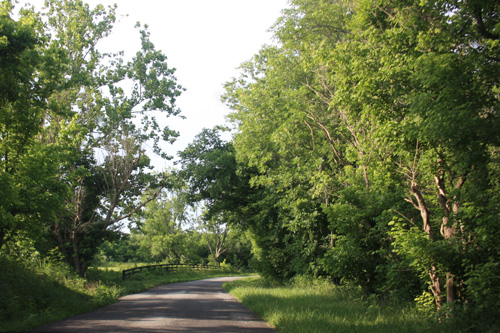
Scenes along a rural Kentucky road.
(*photo
credit)
May 30, 2010
Spreading Good News through a Loving Community
I
am immersed in God's creation; I praise God for the life-giving
gifts given over a long span of precious time. My prayer of praise
expresses my understanding of how I can act in this world.
Realizing that I do not act or pray alone, I am moved to come
together with others to be part of a worshipping community. We are
God's children now; we proceed to realize the greatness of God's
majestic gifts, expressing gratitude on our part, and a dynamic love
that encourages us to share with others. In doing so, we show that
we are made to God's image and act in a God-like, even a "trinitarian,"
fashion. Our worship contains patterns that could be translated
into a new world order, grounded in our Christian faith, our hope in
future glory, and our loving deeds; here past and future come
together in one present act of oblation.
We bear Good
News when in community we perceive God's gifts to us; we do more
than voice our communal praise; we perform loving deeds for and with
others. Involved in this total action on our part is an environment
of gratitude that is shown through the total sharing of all that we
are and have. Our own understanding of Christ being present takes
on a special significance. We perceive that we have been privileged
in the close connection we have within God's family, and this allows
us to proceed, spreading out of what we have been given through
radical sharing of resources.
Mighty
acts of God are experienced. In late spring when the world
comes alive, we discover rebirth and our entire being is filled with
exaltation. Some become so overwhelmed that they stop and focus
their attention on a flower, a plant, a special creek. However, we
go beyond the temptation to stop for long and focus, and look up at
the broader vista, the greatness of all God's creation. Thus we
gather and express ourselves as a community in articulated praise
that incorporates the uniqueness of assembled members. Private
prayerful experience gives way to public worship.
Proclaimed
Word shows our understanding. Why capitalize "word" in this
context? Our articulated words when proclaimed together incarnate
the "Word," Christ himself. In speaking as a body, the Church, we
unite as people who are the Body of Christ, and our spoken
liturgical Word is the fullness of the Lord in our midst. Whenever
we pray, Christ is with us; when we spread the message, he is with
us. All too often the example of misplaced words becomes
publicized; when differences of interpretation are magnified, then
the spreading is stifled to some degree. A faith-filled community
professes the spoken Word in unison.
Loving Deeds
are put into practice. The Spirit empowers us to go beyond
speaking in public assembly; we are now able to go forth and put
what we uniquely understand into actual deeds. The freer we are,
the better we can perform right deeds, to be sensitive to and serve
the others' needs on matters that are essential to them.
Prayer:
Show us, Lord, how our actions proclaim who you are.
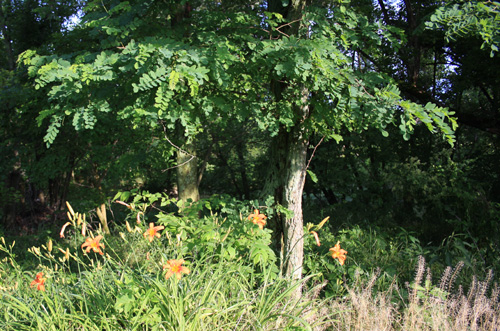
A patch of lilies marks an old
homestead.
(*photo
credit)
May 31, 2010
Founding a New World Order on the Magnificat
The Song of
the Virgin is the prophetic announcement of the mystery of the total
salvation of humanity. John Paul II
Today
is the Feast of the Visitation, in which we read from the Gospel of
Luke, Chapter Two, the words of the Magnificat or Mary's response to
Elizabeth's greetings. These words are pertinent today because of
the dysfunctionality of the current social, political and economic
order in our nation and the world. This is becoming apparent to all
astute observers of the signs of the times. Are satisfactory
answers to our questions to be found among the recognized economists
and political thinkers? Is not the bias of the affluent so deep and
divisive that one simply must look elsewhere? Affluence deadens the
spirit and leaves the soul desiccated, and thus it is nearly
impossible for inspiration to come solely from an affluent culture.
Should
we look for inspiration from within the non-affluent portions of the
world's population where the spirited response of the lowly plays an
immense role? If Mary helps usher in the salvation event through a
simple fiat, surely her song of praise, the Magnificat, has
something to say about a New World Order.
From a spiritual
perspective, the one who will inspire will be the one who is most
inspired, the humblest and most lowly, the one who is most
transparent and pure, the one who is closest to God, the Virgin
Mary. What Mary experiences in her life, we as members of Church
are to do on our spiritual journey to rebuild a troubled world.
Like Mary, we, as democratic people, are called to participate in
salvation history. In many ways Mary shows her lowly birth, humble
upbringing and universal concern for the poor.
Mary
goes before us, though she is infinitely unique; we follow in her
footsteps in humble but unique ways as well. Mary's proclamation is
ours today -- a revolutionary prayer of the Church. We are to bear
Christ to other people, and thus we too are called to become
involved in salvation history -- the saving of our planet. Mary
goes before us though infinitely unique; we follow both as
individuals who bear Christ and as a community of faith who enters
into salvation history in unique ways. Reflection on her song of
praise had immense possibilities for us who fumble in our search for
new meaning.
Mary's
song contained at least the following elements or qualities that are
components of any radical change leading to a New World Order:
praise and thanksgiving, blessings, spiritual privilege, fear of
God, non-violence and compassion, grass-rooted participation,
spiritual sustainability, merciful service, and continuity in
tradition. If modern change agents take on these qualities, we can
be assured that justice will prevail. See our Special Issues coming
soon; Magnificat: A Bluebook for Ushering in a New World Order.
Prayer:
Lord, help us to proclaim the words of the Magnificat and not to
be shamed by those who deride us for our efforts. |